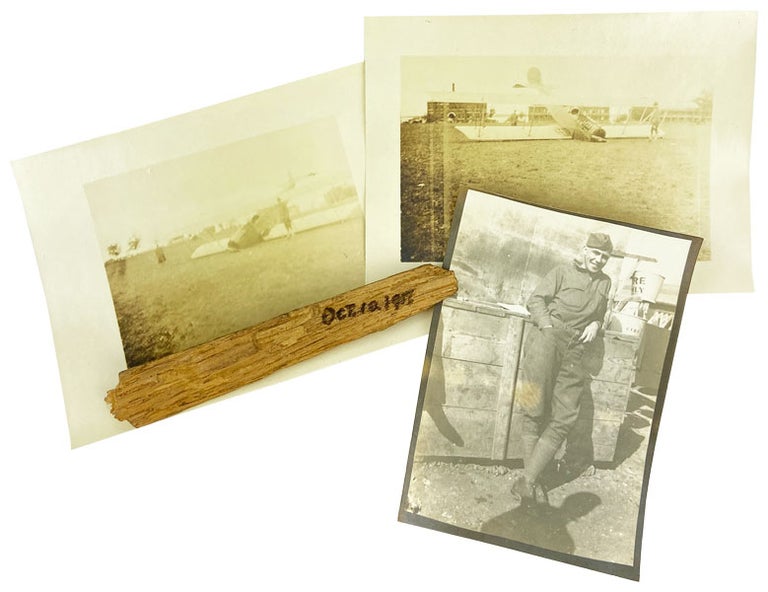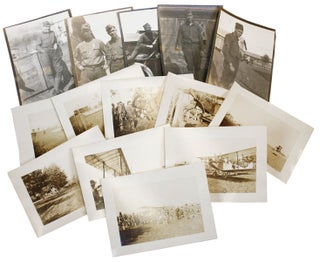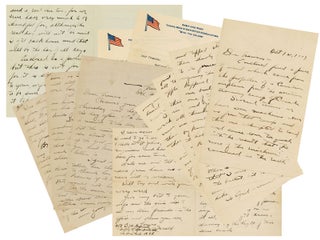Archive of World War I Letters, Photographs, and Ephemera, addressed to Francis P. Deimer of Napoleon, Ohio
Columbus, Sacket Harbor, Is-sur-Tille, and others: 1917. Very Good. Item #20905
Columbus, Sacket Harbor, Is-sur-Tille, and Others: 1917-1919. Archive consisting of 38 letters, mostly autograph and accompanied with original mailing envelopes; 14 snapshot photographs; and the shard from a wooden airplane propeller. Letters with usual mail folds and some wear, else a Very Good, well-preserved archive.
Collection of letters addressed to businessman Francis P. Deimer, general manager of the Napoleon (Ohio) Home Telephone Co. The vast majority (30) of letters are from former office-mate Gerald Donnelly, whose correspondence spans the entirety of his participation in the Great War, from his arrival at the Columbus Barracks in Ohio to the Madison Barracks in Sackett Harbor, New York, to "Somewhere in France" (later revealed to be the American Expeditionary Force Camp William in Is-sur-Tille, a village fifteen miles west of Dijon). Donnelly proved to be a steady, observant, and humorous correspondent. Early letters, written while still in Ohio, describe the perks of enlisting: "Just had dinner a short while ago and am stuffed full, I will be so fat when I get back that you won't know me. For dinner we had boiled beef, mashed potatoes, tapioca pudding with raisins in it, corn on the cob with butter and water to drink and all the meals run along that order and you get all you can put into you" (August 16, 1917). Two weeks later Donnelly describes the Ohio State fair: "It is soft to get in, anybody with a U.S. uniform on just walks in with his head high in the air and don't even look at the man taking tickets." His transfer to Madison Barracks proves no less comfortable: "Have nice quarters right on the lake front and a pretty place here" (September 17, 1917). A special highlight from Donnelly's tenure at Sackets Harbor is witnessing the crash of a Canadian airplane from the aviation training camp north of the border. "Several times we have seen machines above us from that camp and this one attempted to land and came down too quick with the result that the nose of the machine rammed in the earth and tipped straight up and then slowly settled back to the former position, without injuring the aviator" (October 12, 1917). As one of the first on the scene, Donnelly was able to keep a piece of the wooden propeller, which he enclosed with his letter describing the event and present here. A collection of nine photographs sent a couple weeks later includes images of the crash itself. Donnelly would be shipped to France in December of that year, the quality of life described in his letters steeply declining: "Just washed my hands and face a rare occurance and one to be celebrated as it happens only once in a while" (February 27, 1918).
Additional correspondence includes five letters from an E.C. Donnelly, possibly a brother of Gerald's, who was stationed with the 38th Balloon Company in Arcadia, California: "A week or so ago a storm came up and one balloon broke loose and went up to 6500 ft and was struck by lightening [sic] and started to burn, as soon as all the gas escaped the rain put the fire out and the balloon fell to earth. The Lt. was in the basket and froze his hands coming down. In landing the basket hit a fence post and drove thru the bottom of [the] basket pinning the lieut. between the post and the side of [the] basket but it did not hurt him. He was out the next day" (June 15, 1918). On a lighter note, later in the summer, E.C. writes "Charlie Chaplin is in camp now I guess they expect to take a picture here today as the movies bought one of our old balloons and I understand they are going to blow it up Sunday" (August 29, 1918). We have been unable to ascertain which Charlie Chaplin action film included a hot air balloon blowing up. Overall the archive provides a detailed and diverse account of the American experience of the Great War both at home and abroad.
Price: $750.00



